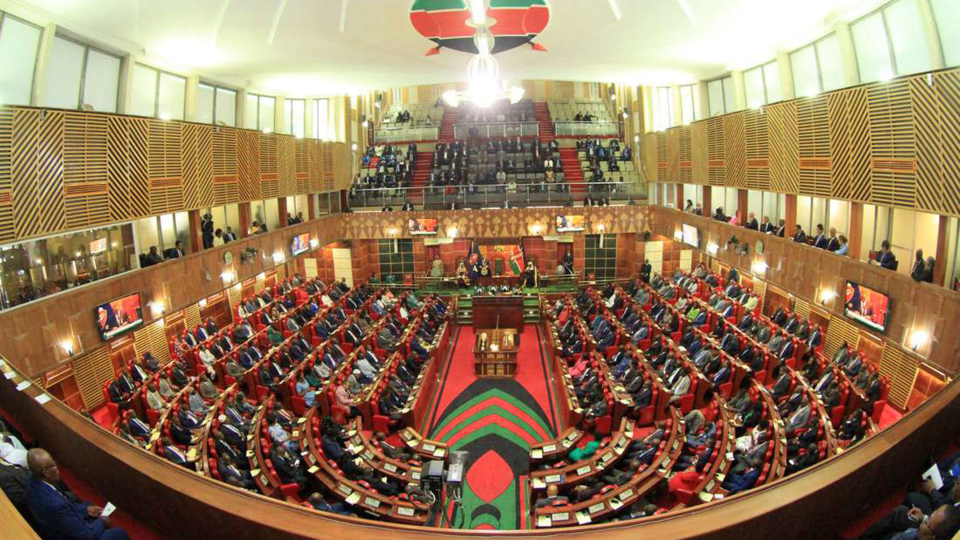Clash Looms as Senate Pushes for Expanded Powers in New Bill
On August 12, 2025, a significant political development emerged in Kenya as the Senate introduced the Constitution of Kenya (Amendment) Bill of 2025, sparking potential conflict with the National Assembly. This legislation, sponsored by Senate Majority Leader Aaron Cheruiyot and Minority Leader Stewart Madzayo, aims to significantly enhance the Senate’s authority, moving beyond its current focus on county government matters. The proposed changes seek to redefine the balance of power between Kenya’s two legislative houses, potentially reigniting longstanding tensions over legislative supremacy.
The Constitution of Kenya (Amendment) Bill of 2025 proposes amendments to six articles of the Constitution: 157, 215, 228, 229, 233, and 250. These changes would grant the Senate equal authority with the National Assembly to vet and approve key state officers, including Cabinet Secretaries and Principal Secretaries. Currently, the National Assembly holds primary responsibility for such approvals, while the Senate’s role is largely limited to matters concerning county governments.
Additionally, the bill seeks to streamline the legislative process by allowing most bills, except those related to national revenue, to be introduced in either house of Parliament. This reform aims to create a more balanced legislative framework, ensuring both houses play significant roles in lawmaking and budget oversight. According to the bill’s sponsors, these changes are designed to strengthen devolution, improve accountability, and enhance representation for counties and marginalized groups, including women, youth, and persons with disabilities.
The bill’s stated objective is to clarify the roles of constitutional organs and institutions in the devolution process, ensuring that both the Senate and the National Assembly contribute effectively to legislative and budgetary functions. By refining these processes, the bill aims to safeguard the implementation of devolution, a cornerstone of Kenya’s 2010 Constitution, and promote a more equitable distribution of power between the two houses.
The push for expanded powers reflects the Senate’s desire to assert its role as the “Upper House” and address what it perceives as marginalization by the National Assembly. Senate leaders argue that the current constitutional framework limits their ability to influence critical national decisions, particularly those affecting devolution. The bill’s sponsors, Cheruiyot and Madzayo, emphasize that the proposed reforms will enhance the Senate’s capacity to represent county interests and ensure that devolution is effectively implemented.
To counter perceived attempts by the National Assembly to undermine its authority, the Senate has formed a special task force led by Cheruiyot and Madzayo, alongside prominent senators such as Tom Ojienda, Okong’o Omogeni, Edwin Sifuna, and Hillary Sigei. This task force was established following an informal meeting of all senators, chaired by Senate Speaker Amason Kingi, at Parliament Buildings. During this meeting, senators vowed to resist efforts by Members of Parliament (MPs) to diminish the Senate’s mandate, particularly in response to the National Assembly’s push to entrench the National Government Constituency Development Fund (NG-CDF) in the Constitution.
The NG-CDF, a contentious issue between the two houses, has been a focal point of their rivalry. Senators have accused MPs of excluding them from decisions related to the fund, which allocates resources for constituency-level development projects. The Senate’s opposition to the NG-CDF’s entrenchment stems from recommendations by the National Dialogue Committee (Nadco), which senators claim was hijacked by MPs to legitimize the fund without Senate input.
The introduction of the Constitution of Kenya (Amendment) Bill of 2025 risks escalating tensions between the Senate and the National Assembly, which have a history of rivalry over legislative authority and control of resources. Constitutional scholar George Oyoo warns that the bill could intensify this power struggle, as both houses vie for greater influence. Oyoo notes that the framers of the 2010 Constitution did not intend for such rivalry, but the desire for dominance has hindered harmonious coexistence and effective legislative collaboration.
Previous clashes between the two houses have centered on issues such as legislative authority and control over funds like the NG-CDF. Senators have frequently alleged that the National Assembly sidelines them, particularly by rejecting Senate bills as “money bills” only to reintroduce similar proposals under different sponsorship. This practice has fueled accusations of deliberate efforts to weaken the Senate’s legislative role.
Jill Cottrell Ghai, a legal expert from the Katiba Institute, has called for greater cooperation between the two houses to avoid prolonged political gridlock. Ghai points out that courts have repeatedly intervened to affirm the Senate’s role in matters concerning county governments, underscoring the need for both houses to work collaboratively to fulfill their constitutional mandates.
The Constitution of Kenya (Amendment) Bill of 2025 represents a pivotal moment in Kenya’s legislative landscape. If passed, it could fundamentally alter the balance of power between the Senate and the National Assembly, giving the Senate a more prominent role in national governance. Proponents argue that this would strengthen devolution by ensuring that county interests are better represented at the national level. However, critics caution that the bill could exacerbate tensions, leading to delays in the legislative process and potential legal challenges.
The bill’s focus on enhancing accountability and representation aligns with broader efforts to refine Kenya’s governance framework. By granting the Senate authority to vet key state officers and initiate legislation, the bill seeks to create a more equitable partnership between the two houses. However, its success will depend on the ability of lawmakers to navigate the existing rivalry and reach a consensus on the proposed reforms.
As the Senate pushes for expanded powers through the Constitution of Kenya (Amendment) Bill of 2025, Kenya’s Parliament faces a critical juncture. The proposed changes aim to bolster devolution and redefine the Senate’s role in national governance, but they also risk reigniting tensions with the National Assembly. With both houses asserting their authority, the coming months will be crucial in determining whether this bill fosters greater legislative harmony or deepens the divide. The outcome will have significant implications for Kenya’s devolved system of government and the balance of power within its bicameral legislature.


